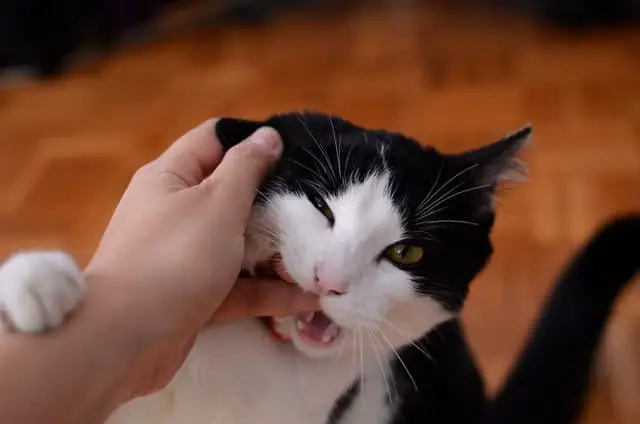
Even if we adore them, it must be recognized that our hairballs can sometimes hurt us while playing or be slightly aggressive. Despite their desire to have fun with us, it happens that their impulses exceed them and that our cats attack us. In addition, it is also possible to be surprised by a feline when you simply wanted to pet it. Let’s not forget that animals are unpredictable, so it’s important to take it easy when meeting them. Here is some information about the different risks incurred following a cat scratch or bite.
The different reasons for an attack
Fortunately, substantial bites or scratches are not common when you have a cat, unless it is very aggressive. It is important to give your animal time before you can handle it properly. Thus, if you have just adopted one, for its well-being, do not skip the essential steps. However, there are different reasons why a cat may attack you, here are some possible cases.
Fear
First, your cat may be fearful and react out of suspicion. If this is the case, do not hesitate to be patient and give him time to acclimatize to the possible changes to which he is exposed. It is also essential not to insist when he does not want to do something and never force him to get anything from him. It is important that your cat is willing in games, but also if he wants cuddles. The more you insist, the more likely he is to turn up his nose.
The fear
Feral cats can be very aggressive. It is therefore important not to bother them if you see them. In reality, the fear of humans can lead them to an attitude of defense or attack. In this case, do not try to enter into conflict with them, and ignore them. The less pressure there is, the less chance there will be that a cat will decide to attack you to protect itself from potential danger.
The game
In another scenario, your cat may bite or scratch you when you play with it. He is normally used to these methods with his congeners and therefore does not necessarily make a difference when it comes to you. Although it may be upsetting, it may not be intentional and emotions take over control. Moreover, this attitude can also be a signal from your feline: he may not want to play anymore and wants to stay quiet.
A malaise
If your cat is often cuddly, affectionate and gentle with you, an aggressive attitude should lead you to question your state of health. Indeed, it can be a manifestation related to pain. Animals cannot speak, if you perceive a change in attitude that does not resemble your tomcat, do not hesitate to contact a veterinarian quickly.
Possible problems
Whether wild or domestic, the cat can transmit diseases to us with a scratch or a bite. Indeed, their claws like their teeth are not clean and are often even real nests for germs and bacteria. Thus, these attacks can easily cause more or less serious infections. Possible risks are mainly related to pasteurellosis, sporotrichosis and Bartonella henselae.
Cat scratch disease
Cat scratch disease is transmitted to humans through scratches or bites. It is also called “benign inoculation lymphoreticulosis” and is linked to the bacterium Bartonella henselae. This comes from fleas, so it is even more important to protect your animal against the various parasites to avoid any problems.
Pasteurellosis
Pasteurellosis is less common than the previous bacterium. However, it is not non-existent. Indeed, our animals are often carriers in the oral cavity. Therefore, this bacterium is transmitted after a bite or a scratch. The infection appears a few hours after the accident with pain, redness or oozing from the wound. In addition, victims may have a slight fever afterwards. If the person is quite fragile from the start (diabetes, alcoholism, immunosuppression, etc.), this can also give rise to complications.
sporotrichosis
Sporotrichosis is an infection caused by a fungus. Although it is more common in the tropics, some exceptional cases have occurred in Europe. After the scratch, however, symptoms may take several days or even months to develop.
What to do after a cat bite/scratch?

After a cat bite or scratch, it is imperative to act quickly whether it is a domestic cat or not! First of all, it is very important to properly disinfect the injured area with soap and water. This first step greatly reduces the other risks of infection. Then apply an antiseptic to the lesion. Thereafter, closely monitor the evolution of the lesion and your condition, and check your vaccination against tetanus.
You will not see a doctor directly if you are attacked. However, if your eye is affected, it is imperative to consult urgently so as not to have more serious problems. After the accident, here are some symptoms requiring the consultation of a doctor:
- Inflammatory reaction
- Nodule at the level of the lesion
- Appearance of lymph nodes or fever
- Fatigue, low energy or poor general condition.
Thus, it is important to be vigilant with your animals and to always wash your hands well. Moreover, in more than half of the cases, the scratches or bites come from the family cat. So make sure your tomcat is in good health, but also that he is properly treated against fleas and worms. In addition, regular monitoring with the veterinarian can identify potential problems for your animal. These visits are very important to ensure that everything is always going well.






